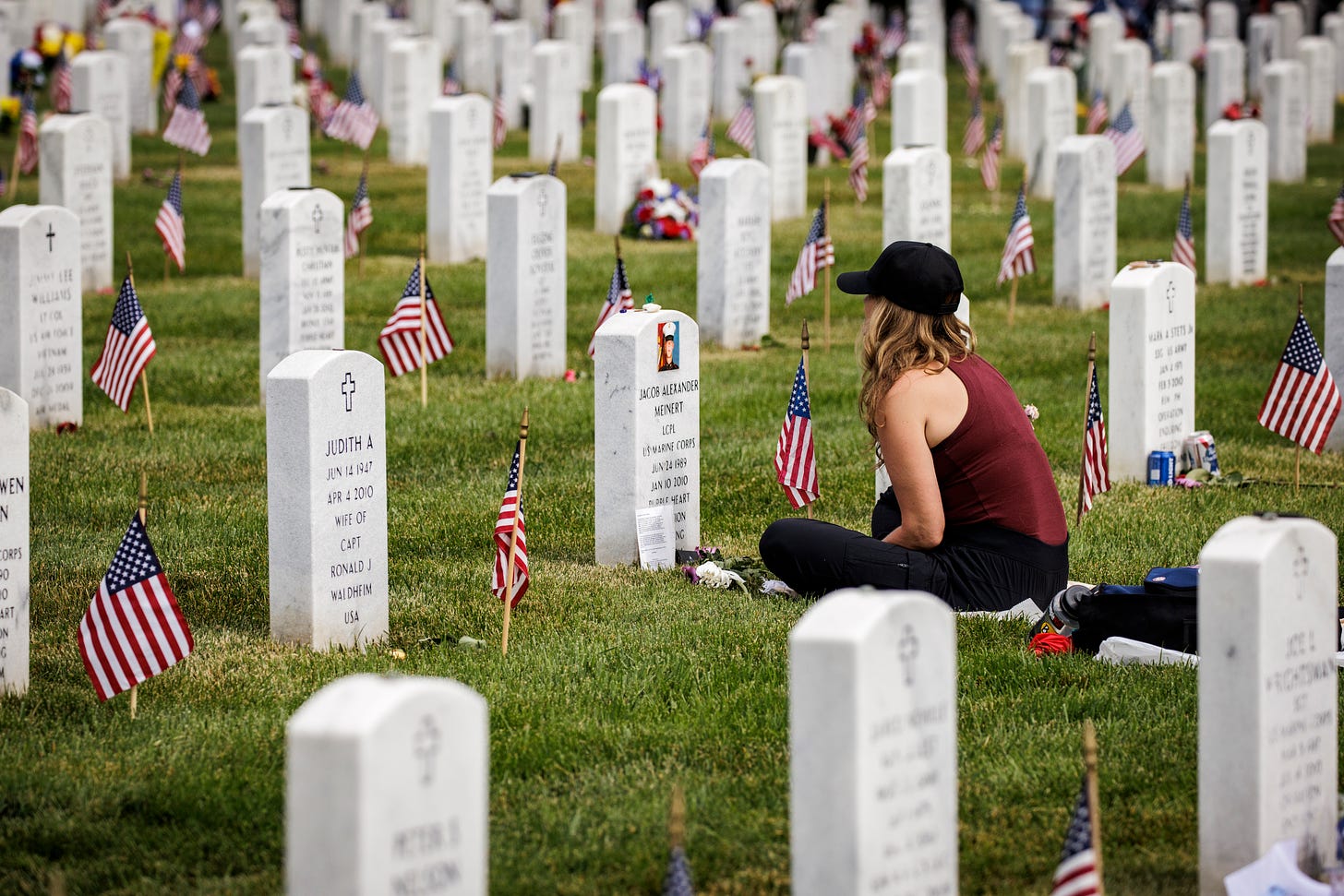Remember the Gold Star Families
This Memorial Day, honor the families who are reliving the worst moment of their lives.

ONE OF MY LAST RESPONSIBILITIES as an Air Force officer was to deliver the most devastating news imaginable to a military family: Their child had died while serving on active duty.
Serving as a casualty notification officer is always a temporary assignment—which is good, because as important as the work is, no one wants to do it for too long. Each of the officers around the country assigned the duty covers their local area. The movies typically depict casualty notifications after someone dies in combat, but it can be even tougher to inform a family about non-combat fatalities.
I remember the first time I volunteered for a notification last fall. “You sure you want this?” the officer in charge asked me.
He was right to be concerned. I was three months removed from a month in an intensive inpatient treatment program for combat post-traumatic stress disorder, moral injury, and traumatic brain injuries. He had seen what the wars had done to me.
But after three months of therapy and hyperbaric oxygen treatment, I was on the mend. I had taken my first steps toward moral recovery. I had learned to breathe again. For the first time in a very long time, I felt more lucid and less anxious.
IN LESS THAN NINETY MINUTES, I was in my service dress uniform and off to meet the chaplain and physician’s assistant near the parents’ house. Before we were allowed to relay the message to the parents, we had to sign a tall stack of forms, ensuring we were “properly trained.” In truth, all the training in the world can’t teach you how to do this job. You can ask for advice, but until you’re faced with delivering death’s cruel fate to unsuspecting family members, it’s all academic.
I pulled up to the rally point and greeted my teammates. While this sober moment required grit and grace, I tried to lighten the mood by injecting humor.
“I see I got the All-Star team with me,” I loudly proclaimed. “Happy to serve alongside of you.”
Both men smiled.
Next, we did a quick uniform inspection. The service dress needed to be impeccable, and I’m not always that way, so my teammates helped get my uniform up to snuff for the moment. The perfect knot of a tie and arrangement of ribbons doesn’t mitigate the unimaginable pain but does send an undeniable message to the families: You deserve our very best.
As I stepped inside the passenger seat and looked over the fallen airman’s information, my mind started racing through all the difficult conversations I’d had throughout my twenty-year career.
I’ve informed hundreds of people that their friends or loved ones have died. Stateside, I delivered the devastating news to my squadron about the tragic death of a brother-in-arms. In the field, I’ve tried to console soldiers, sailors, and Marines about their friends’ deaths.
Over the previous two years, I’d had hundreds more unbearable conversations with Afghans who were desperately trying to save themselves and their families.
“No, brother, you cannot take your daughter out of Afghanistan,” I would explain with as much firm tenderness as I could muster. “According to our immigration rules, someone over twenty-one is no longer part of the immediate family.”
Imagine hearing that message from a friend. Sorry, you can save yourself but not your daughter because of some rule created by an agency with only Western families in mind. Due to these rules, thousands of families were separated during the fall. Husbands left wives behind; fathers, their daughters; and mothers, their sons.
“Brother, you have two choices: either you go and then work to get her to the United States, or everyone stays in Afghanistan,” I would counsel. They each made their own decisions, and I don’t know who chose right and who chose wrong.
These hard conversations taught me to talk less and to be precise with my words. Don’t leave room for ambiguity, and don’t speculate, especially with American family members. It only causes more heartache and pain.
“I regret to inform you that ____ was killed/died yesterday. An investigation into the cause of death is ongoing. Unfortunately, that’s all the information I can share.”
Some families remain stoic until you leave. Others will cry out in horror, sobbing uncontrollably. Combat deaths often elicit a different response than non-combat deaths, like car crashes and training mishaps. You have to be prepared for a broad range of emotions.
Tragically, the system does not always work. Sometimes, word leaks out before official notification is delivered. Often, grieving servicemembers will understandably speak with someone, causing a chain reaction that delivers the news to families without official representation at the door. With the rise of non-traditional families, the Department of Defense tries to stay flexible enough to notify the correct person first, but sometimes that’s impossible.
In a perfect world, the casualty notification official delivers a message with respect, dignity, and honor. Shortly after, a liaison officer will contact the service member’s family to begin a multi-step process, which includes receiving the body and any property the servicemember left behind. The liaison officer will often work with the service member’s unit to coordinate attendance at the unit’s memorial service.
But before all that happens, there’s a knock at the door.
THE FATHER AND MOTHER were outside on their deck. The look on their faces is forever imprinted on my mind. I was their worst nightmare come true. Although word had leaked to them of our pending arrival, I quickly realized it didn’t matter because I was extinguishing any hope that this had all been a mistake—that maybe their son had been mixed up with another airman serving somewhere else.
As I stepped out of the car, I could hear the mother's first sobs. I quickly blocked that out, concentrating on my role in this dignified exchange of information. Everything else was outside of my control. The message I had to deliver needed to be short, empathetic, and respectful. I told myself, When you return home, there will be time to process everything with your wife. But now, focus on the task at hand. I had told myself similar things countless times before in Iraq and Afghanistan.
As I walked up the steps, I acknowledged the mother and approached the father, a fellow active-duty service member. When I was approximately five from him, my eyes met his, and I found my voice.
“Good afternoon, sir. I’m Lt. Col. Will Selber. May I speak with you inside?”
“Yes,” said the father resolutely. “Let’s go inside.”
Throughout my four years downrange, other nameless officers delivered similar messages to the parents of my troops, friends, and allies. I often wondered how the exchanges went. While I’m friends with a few of my dead brother’s families, I’ve never asked them about their own experiences. I’m unsure my body could handle the rage if I found out it went poorly.
I just pray that whoever delivered the message understood that there is no higher honor. The service members who guide Gold Star families through their grief are official representatives of the military—and the American people. There’s a reason why folded flags are presented to grieving families “on behalf of a grateful nation.” The fallen service member volunteered to defend the Constitution against all threats foreign and domestic at the risk of their own safety. There’s always someone praying they come home from their watch safe—and when they don’t, someone to acknowledge the ultimate reverence for a cause bigger than self, the “last full measure of devotion.” To honor that sacrifice is itself an honor.
THE MOTHER WAS OFF in the corner of the room. She began to sob and pace around the house, unsure what to do next. I’ve found that panic often sets in first, followed by overwhelming grief that cannot be adequately described. In Iraq, I saw mothers identify the bodies of their slain sons and ululate so loudly that I can still hear it as if they’re next to me. Those moments of shared grief spawn nightmares.
My job was to prevent that. Whenever this memory returns in their minds, I want them to be, at the very least, not traumatized by it. We bring the Chaplain to provide a prayer if needed, and wise counsel, too. The doc is there to help with any medical reaction to the news. Parents often faint. Mothers will collapse, sometimes injuring themselves on the way down. Severe cardiac issues are not infrequent. The least Americans can do for their service members’ families is help them survive those first moments.
As always, I started with, “I regret to inform you. . .” The conversation didn’t take long—maybe five minutes total. I provided what little information I could and gave my advice on what to do next, but that’s all it was—advice. While both parents were distraught, they handled the unimaginable with grit and grace. As a father, I don’t think I could’ve handled myself with their poise.
Somehow, the father, at what must have been the most difficult time in his life, was thinking about the three of us who had come to deliver the news—maybe for the same reason that, after the most difficult time in my life, I had chosen to go to him.
As we walked outside, I turned to look at him and quickly said, “May his memory be a blessing, sir.” They weren’t Jewish, but I find the traditional words of condolence are often comforting even to those who aren’t familiar with them.
“Thank you, colonel,” he muttered. “You guys did great. Your uniforms look sharp. Thank you.”
And just like that, it was over.
DURING MY COMMAND TOUR from 2021 to 2023, we lost multiple airmen. We held memorials for their grieving parents, attended their funerals, and sometimes spoke at them, too. We dedicated our newest building to one of our fallen comrades—his mother put his nameplate on its walls. In Afghanistan, a dining facility was named after one of my airmen killed in action.
Death is a part of life in the military. But the rituals and ceremonies surrounding it are special. I’ve attended scores of makeshift ceremonies on small bases at the outer edges of civilization. I’ve knelt before coffins inside C-17s before my brothers-in-arms were flown home.
As you celebrate Memorial Day, please take a moment to reflect on those who paid the ultimate sacrifice to defend this magnificent country. Remember their comrades, who are also grieving their friends killed in two forgotten wars.
More importantly, pray for those family members who are reliving their moments with casualty notification officers like me.





